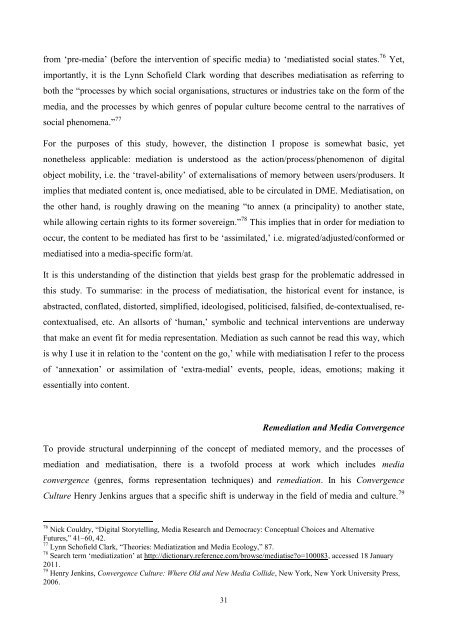UNIVERSITY OF NOVA GORICA GRADUATE SCHOOL ...
UNIVERSITY OF NOVA GORICA GRADUATE SCHOOL ...
UNIVERSITY OF NOVA GORICA GRADUATE SCHOOL ...
Create successful ePaper yourself
Turn your PDF publications into a flip-book with our unique Google optimized e-Paper software.
from ‗pre-media‘ (before the intervention of specific media) to ‗mediatisted social states. 76 Yet,<br />
importantly, it is the Lynn Schofield Clark wording that describes mediatisation as referring to<br />
both the ―processes by which social organisations, structures or industries take on the form of the<br />
media, and the processes by which genres of popular culture become central to the narratives of<br />
social phenomena.‖ 77<br />
For the purposes of this study, however, the distinction I propose is somewhat basic, yet<br />
nonetheless applicable: mediation is understood as the action/process/phenomenon of digital<br />
object mobility, i.e. the ‗travel-ability‘ of externalisations of memory between users/produsers. It<br />
implies that mediated content is, once mediatised, able to be circulated in DME. Mediatisation, on<br />
the other hand, is roughly drawing on the meaning ―to annex (a principality) to another state,<br />
while allowing certain rights to its former sovereign.‖ 78 This implies that in order for mediation to<br />
occur, the content to be mediated has first to be ‗assimilated,‘ i.e. migrated/adjusted/conformed or<br />
mediatised into a media-specific form/at.<br />
It is this understanding of the distinction that yields best grasp for the problematic addressed in<br />
this study. To summarise: in the process of mediatisation, the historical event for instance, is<br />
abstracted, conflated, distorted, simplified, ideologised, politicised, falsified, de-contextualised, recontextualised,<br />
etc. An allsorts of ‗human,‘ symbolic and technical interventions are underway<br />
that make an event fit for media representation. Mediation as such cannot be read this way, which<br />
is why I use it in relation to the ‗content on the go,‘ while with mediatisation I refer to the process<br />
of ‗annexation‘ or assimilation of ‗extra-medial‘ events, people, ideas, emotions; making it<br />
essentially into content.<br />
Remediation and Media Convergence<br />
To provide structural underpinning of the concept of mediated memory, and the processes of<br />
mediation and mediatisation, there is a twofold process at work which includes media<br />
convergence (genres, forms representation techniques) and remediation. In his Convergence<br />
Culture Henry Jenkins argues that a specific shift is underway in the field of media and culture. 79<br />
76 Nick Couldry, ―Digital Storytelling, Media Research and Democracy: Conceptual Choices and Alternative<br />
Futures,‖ 41–60, 42.<br />
77 Lynn Schofield Clark, ―Theories: Mediatization and Media Ecology,‖ 87.<br />
78 Search term ‗mediatization‘ at http://dictionary.reference.com/browse/mediatise?o=100083, accessed 18 January<br />
2011.<br />
79 Henry Jenkins, Convergence Culture: Where Old and New Media Collide, New York, New York University Press,<br />
2006.<br />
31

















